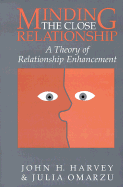Book contents
- Frontmatter
- Contents
- Preface and Acknowledgments
- 1 Introduction to the Minding Concept
- 2 Minding: Definition and Components
- 3 Knowing and Being Known by One's Partner
- 4 Attributions in Close Relationships
- 5 Acceptance, Respect, Reciprocity, and Continuity
- 6 Beginnings and Endings
- 7 Minding in the Close Relationship Literature
- 8 Minding and Other Major Concepts of Closeness
- 9 Evidence about Minding in Close Relationships
- 10 An International Perspective on Minding
- 11 Minding in Couples Therapy and Counseling
- 12 Limitations and Future Directions
- References
- Index
11 - Minding in Couples Therapy and Counseling
Published online by Cambridge University Press: 14 September 2009
- Frontmatter
- Contents
- Preface and Acknowledgments
- 1 Introduction to the Minding Concept
- 2 Minding: Definition and Components
- 3 Knowing and Being Known by One's Partner
- 4 Attributions in Close Relationships
- 5 Acceptance, Respect, Reciprocity, and Continuity
- 6 Beginnings and Endings
- 7 Minding in the Close Relationship Literature
- 8 Minding and Other Major Concepts of Closeness
- 9 Evidence about Minding in Close Relationships
- 10 An International Perspective on Minding
- 11 Minding in Couples Therapy and Counseling
- 12 Limitations and Future Directions
- References
- Index
Summary
When we become wiser, we become sadder.
AnonymousFaith is the bird that sings when the dawn is still dark.
R. TagoreGod, give us grace to accept with serenity the things that cannot be changed, courage to change the things that should be changed, and the wisdom to distinguish the one from the other.
Reinhold Neibuhr, The Serenity PrayerIn this chapter, we discuss how minding might be used in therapy and counseling activities aimed at enhancing close relationships. The quotes that begin this chapter speak to the deep experiential base that we believe is at the heart of minding. We believe that minding can be achieved mainly after people have encountered the pain of serious relationship difficulty, whether or not dissolution occurred. Minding is an adaptive response to the pain that is so frequently found in “closeness.”
Minding is like a “bird singing in the dawn light” – the singing being an act of hope and faith that the dawn will come. Such is the synergy of a well-minded close relationship. Minding contributes greatly to the ability to make distinctions between that which can and should be changed and that which cannot and to the courage needed to make such distinctions – Niebuhr's The Serenity Prayer. As we argue in this chapter, the couple in a well-minded relationship is engaging, in the final analysis, in a coordinated act of hope and faith.
- Type
- Chapter
- Information
- Minding the Close RelationshipA Theory of Relationship Enhancement, pp. 182 - 200Publisher: Cambridge University PressPrint publication year: 1999

